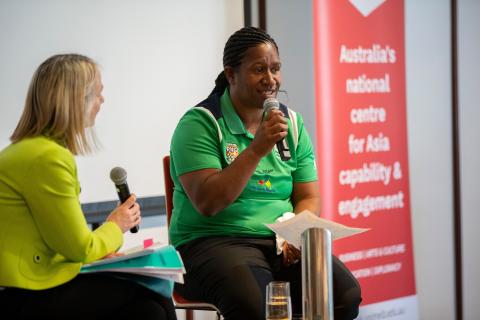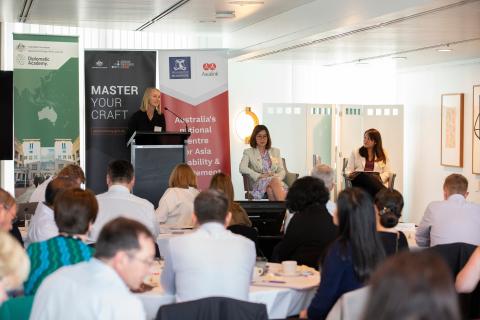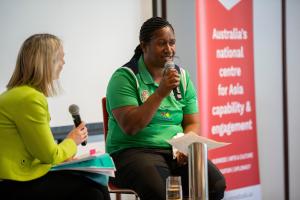By Dr Kath Mann, Executive Programs I APS Academy
International and domestic policy are increasingly intertwined. Nowhere is this more evident than in the area of climate change and energy transition, where the vulnerability of Australia’s nearest neighbours in the Asia and Pacific region impacts our own and vice versa. So what does this mean for agencies working at the intersections of policy and regional architecture? What capability is needed to help guide the nuanced work necessary to engage productively with stakeholders in the region and with the resources at hand?
The Capability Reinvestment Fund (CRF) Round 1 opened a door for APS agencies to nominate their EL2 and high performing EL1 staff who work on domestic policy issues linked to climate and energy transition or on international policy issues with domestic agencies and require specialist knowledge of Asia and the Pacific region. With representation from 27 agencies, this inaugural iteration of the APS Indo-Pacific Executive Development Program (the Program) was delivered by the APS Academy, in partnership with the Department of Foreign Affairs and Trade Diplomatic Academy, and Asialink, Australia’s National Centre for Asia Capability.

Building partnerships in PNG session
Copyright and credits: APS Indo-Pacific Executive Development Program official event photographer
The Program commenced on 2 November with 103 participants from 27 agencies, providing a rich diversity of perspectives shared throughout the 7-month learning journey. For the 96 participants completing the Program, participation deepened their understanding of the Indo-Pacific, gaining particular insight into two key geographies: Indonesia and Papua New Guinea. They explored Australia’s relationship and evolving priorities in the region through the lens of climate change and just energy transition, and developed projects to leverage existing and emerging collaborations with other agencies and countries. Their capstone project presentations showcased the increased confidence and capability of participants to navigate the challenges and opportunities in and with the Indo-Pacific region.
The Program spanned 7 months, with the learning journey involving a mix of in-person immersion, virtual facilitated sessions with cohort connections, and online self-paced modules and readings. Key elements included:
- Virtual Introduction Session (2 hours)
- Canberra Immersive (2 days)
- 3 x self-paced learning modules
- 6 x virtual Masterclasses (2 hour sessions)
- Capstone Project Presentation day
- Graduation ceremony
Program highlights
Graduation was the final step in the 7-month journey for the Program. As part of graduation, participants presented their final project which drew on the program content, cohort and contributors. Their projects served as a bridge to bring relevant insights back to their agency and area of expertise. Projects served as a mechanism for connection, requiring participants to seek input from peers and counterparts in the Indo-Pacific region. The project was also valuable in and of itself, providing almost 100 new ideas to the APS as a result of participants’ work through the Program to enhance their regional literacy. Ultimately, the project contributed to the transformational aim of this program, developing capabilities for navigating challenges and opportunities in and with the Indo-Pacific region.
The diversity of ideas generated through the projects is evident in the array of project key themes:
- Pacific Islands, PNG
- Agriculture, Food supply/ production, Food security
- Sustainability/ Trade, Minerals, Finance
- Measurement science
- Climate resilience/ energy transition, Decarbonisation
- Programs, Capability/ partnerships, Skills/ Training development
Keynote speakers at the in-person Graduation ceremonies included APS Commissioner, Dr Gordon de Brouwer PSM on 28 May, and Australian Ambassador for First Nations People, HE Justin Mohamed on 30 May. Special guests included program advisors, guest speakers from the Canberra immersive experiences, and representatives from Program partners APSC, DFAT and Asialink.

Country Spotlight, Indonesia - Climate Change & Energy Transition (intersectionality)
Copyright and credits: APS Indo-Pacific Executive Development Program official event photographer
The Academy looks forward to offering the next iteration of the Program commencing in the 2024-2025 financial year.




